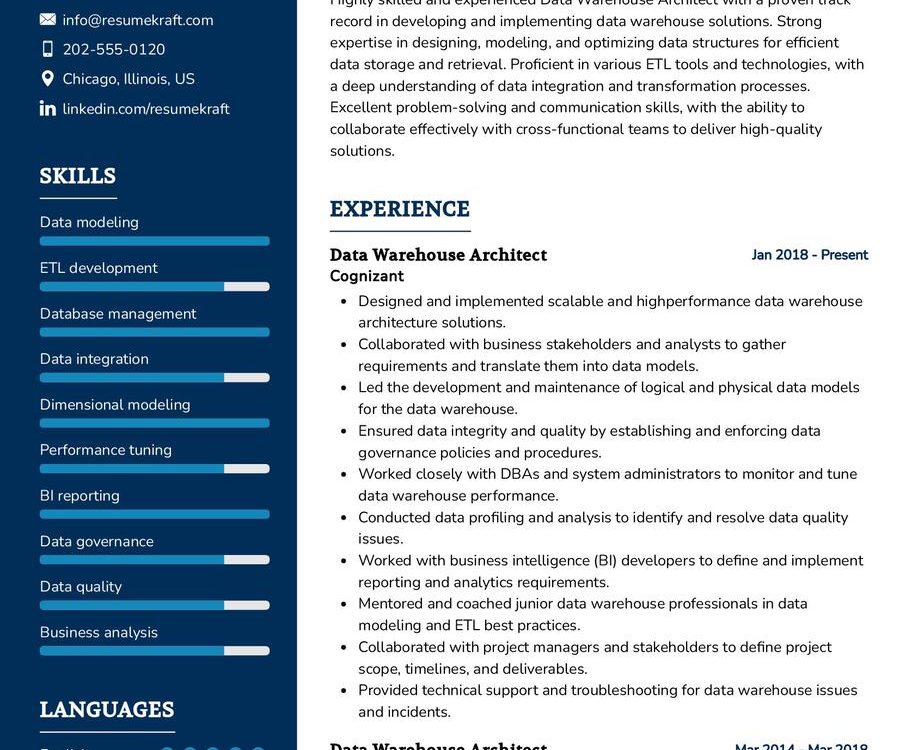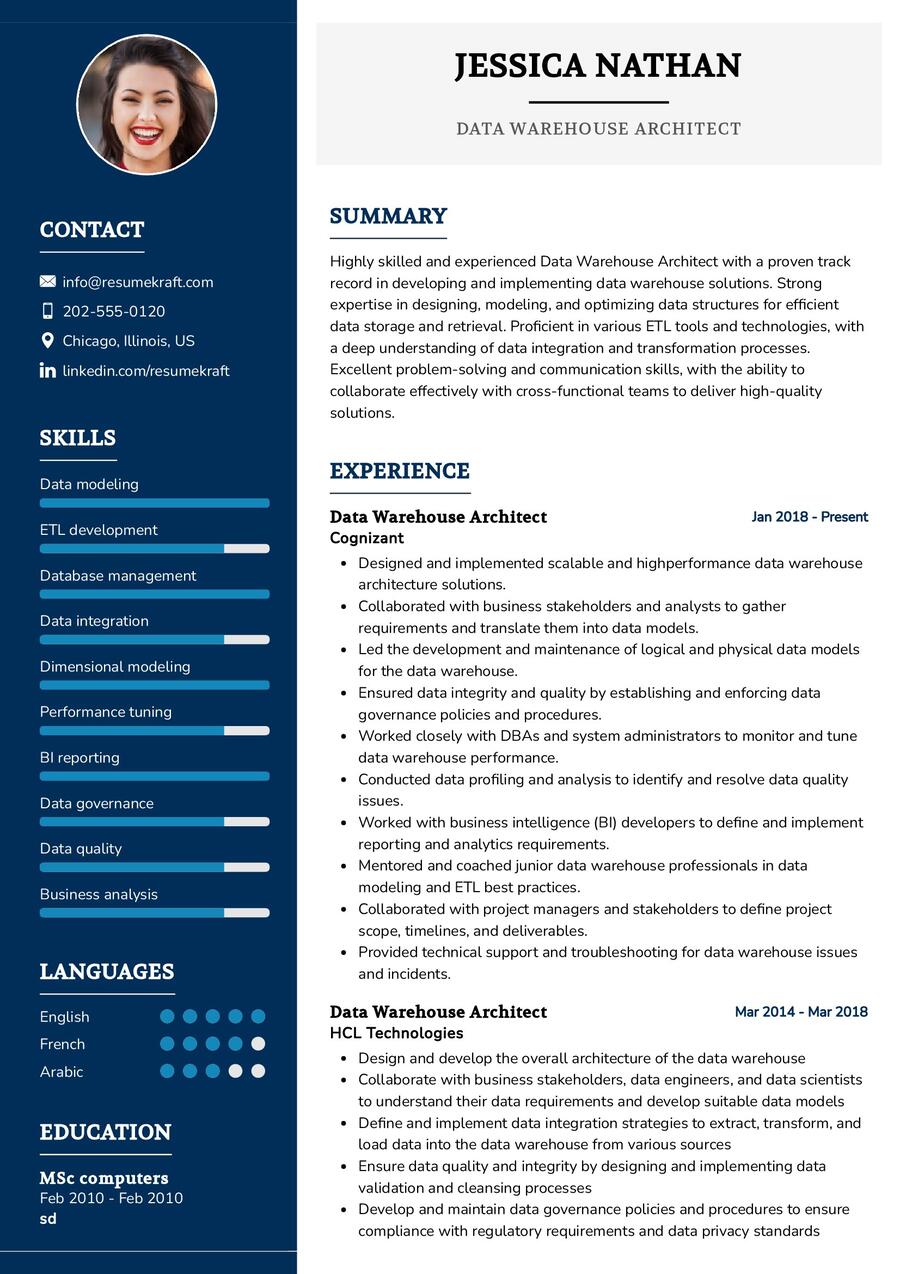Understanding the Role of a Data Warehouse Architect
In the dynamic realm of data management, the position of a Data Warehouse Architect stands as a linchpin for organizations seeking effective data utilization. This role combines technical prowess with strategic vision, steering the architecture of data warehouses to ensure optimal performance and facilitate informed decision-making. Let’s delve into the multifaceted responsibilities and requirements that define the role of a Data Warehouse Architect, exploring the skills and experiences crucial for success in this dynamic field.
Key Responsibilities of a Data Warehouse Architect
A Data Warehouse Architect shoulders diverse responsibilities that contribute to the efficient functioning of data ecosystems within an organization. This role involves:
- Designing and implementing data warehouse solutions tailored to meet the specific needs of the organization.
- Overseeing data modeling and database design to ensure data integrity and optimal performance.
- Collaborating with cross-functional teams to understand data requirements and translating them into scalable and efficient database structures.
- Ensuring the security and privacy of sensitive data through robust data governance practices.
- Leading data migration and integration projects, ensuring seamless transitions and minimal disruption to ongoing operations.
- Staying abreast of emerging technologies and trends in data management to drive continuous improvement and innovation.
- Providing expertise in data architecture decisions, guiding teams to align with organizational objectives.
Each responsibility plays a crucial role in crafting a data infrastructure that empowers organizations to harness the full potential of their data.
Job Requirements for Aspiring Data Warehouse Architects
To embark on the journey of becoming a Data Warehouse Architect, individuals need to meet specific educational and experiential prerequisites. The key requirements include:
- A Bachelor’s or Master’s degree in Computer Science, Information Technology, or a related field, showcasing a solid foundation in database management and architecture.
- Profound knowledge of data warehouse concepts, methodologies, and technologies, with hands-on experience in implementing solutions.
- Expertise in database management systems (DBMS) such as Oracle, SQL Server, or PostgreSQL, and proficiency in data modeling tools.
- Strong analytical and problem-solving skills, essential for designing effective and scalable data solutions.
- Excellent communication skills to collaborate with diverse teams and articulate complex technical concepts to non-technical stakeholders.
- Experience in leading data-related projects, showcasing a trajectory of increasing responsibility and successful implementations.
- Familiarity with cloud-based data platforms, such as AWS Redshift or Azure Synapse Analytics, is a valuable asset.
Acquiring additional certifications in data management and architecture further enhances one’s profile in this competitive field.
Crafting a Data Warehouse Architect Resume
When creating a resume for the role of Data Warehouse Architect, it’s essential to highlight specific experiences and skills that align with the demands of the position:
- Emphasize leadership in overseeing successful data migration or integration projects.
- Showcase instances where your data architecture decisions positively impacted organizational outcomes.
- Quantify achievements with metrics, such as improvements in data processing speed or cost reduction in data management.
- List relevant certifications, demonstrating your commitment to staying updated in this evolving field.
- Customize your resume for each application, aligning your experiences with the specific requirements of the role.
Each element of your resume is an opportunity to present your unique strengths and contributions as a Data Warehouse Architect.
Data Warehouse Architect Resume Summary Examples
Your resume summary serves as a snapshot of your career journey, encapsulating your experiences and the value you bring to the table:
- “Experienced Data Warehouse Architect with a proven track record in designing and implementing scalable data solutions, adept at leading cross-functional teams for successful project outcomes.”
- “Strategic Data Warehouse Architect with a deep understanding of data governance, demonstrated through secure and efficient database designs, contributing to organizational excellence.”
- “Innovative Data Warehouse Architect specializing in cloud-based data platforms, driving digital transformation through effective and scalable data architectures.”
Each summary provides a glimpse into your expertise, setting the stage for a comprehensive exploration of your career achievements.
Building a Strong Experience Section for Your Resume
Your experience section is the narrative of your career, showcasing the milestones and contributions you’ve made in previous roles:
- “Led a team in implementing a data warehouse solution, resulting in a 30% improvement in data processing efficiency.”
- “Initiated and oversaw the integration of data from multiple sources, enhancing the organization’s ability to make data-driven decisions.”
- “Developed and implemented data governance policies, ensuring compliance with industry standards and data security best practices.”
Each experience narrates a story of challenges overcome and successes achieved, establishing you as a valuable asset in the field of data architecture.
Educational Background for a Data Warehouse Architect
Your educational journey is the foundation upon which your expertise rests. Highlight your educational qualifications in a way that showcases your commitment to continuous learning:
- Master of Science in Computer Science, XYZ University, 2019 – Specialized in Database Management.
- Bachelor of Technology in Information Technology, ABC University, 2015 – Laid the groundwork for a successful career in data architecture.
- Data Management Professional Certification, Data Management Association (DAMA), 2020 – Validating your expertise in the field.
Each qualification is a testament to your dedication to mastering the principles of data management and architecture.
Skills Essential for a Data Warehouse Architect
Your skill set is a toolbox, equipped with the abilities necessary for excelling in the role of a Data Warehouse Architect:
Soft Skills:
- Leadership and team collaboration, essential for guiding teams towards successful data solutions.
- Effective communication, enabling you to convey complex technical concepts to diverse stakeholders.
- Problem-solving acumen, crucial for addressing challenges in data architecture and management.
- Attention to detail, ensuring the integrity and accuracy of data models and structures.
- Adaptability and resilience, vital for navigating the evolving landscape of data technologies.
Hard Skills:
- Proficiency in database management systems like Oracle, SQL Server, or PostgreSQL.
- Expertise in data modeling tools such as Erwin or IBM Data Architect.
- Knowledge of cloud-based data platforms, including AWS Redshift or Azure Synapse Analytics.
- Experience with ETL (Extract, Transform, Load) processes for data integration.
- Understanding of data governance principles and practices.
Each skill in your arsenal contributes to your ability to architect robust and efficient data solutions.
Common Mistakes to Avoid in Your Data Warehouse Architect Resume
While crafting your resume, steer clear of common pitfalls that can hinder your chances of securing a Data Warehouse Architect role:
- Avoid using generic language; tailor your resume to showcase your unique fit for each role.
- Highlight achievements rather than listing job duties, providing depth to your narrative.
- Do not underestimate the importance of a cover letter; use it as an opportunity to connect personally with potential employers.
- Balance technical jargon; ensure your resume is accessible to both technical and non-technical readers.
- Proofread meticulously to maintain a polished and professional image.
Avoiding these mistakes ensures your resume stands out as a compelling and authentic representation of your qualifications.
Key Takeaways for Your Data Warehouse Architect Resume
As we conclude this comprehensive guide, remember these key points when crafting your Data Warehouse Architect resume:
- Highlight your leadership in designing and implementing scalable data solutions.
- Showcase your expertise in data governance, emphasizing secure and efficient database designs.
- Quantify achievements to provide a tangible impact of your contributions to previous organizations.
- Include a section on continuous learning, showcasing relevant certifications and courses.
With these insights and tips, you’re well-equipped to create a resume that effectively communicates your journey, skills, and aspirations as a Data Warehouse Architect. Best of luck!
Finally, feel free to utilize resources like AI Resume Builder, Resume Design, Resume Samples, Resume Examples, Resume Skills, Resume Help, Resume Synonyms, and Job Responsibilities to create a standout application and prepare for the Data Warehouse Architect job interview questions.


